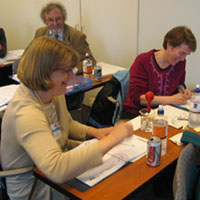Professional Development Helps Connect Science Centers and Schools
Class field trips to zoos, science centers, and planetariums are familiar experiences for most of us, but they are not the only ways in which informal science institutions (ISIs) support the formal K–12 school system. Indeed, a 2005 study of the relationship between ISIs and schools conducted by the NSF-funded Center for Informal Learning and Schools found that more than half of the nation’s ISIs offer some kind of professional development programming for teachers. But with shrinking budgets and No Child Left Behind mandates, it’s becoming more difficult for ISIs to fulfill this important part of their mission.

-
Science educators share ideas at a Project 2061 workshop.
To help remedy the situation, Project 2061 and several science centers have joined forces to bring the popular “Using Atlas of Science Literacy” workshops to teachers around the country. These workshops provide a broad introduction to Project 2061’s tools and strategies for improving science teaching and learning.
Beginning with a workshop in 2002 co-hosted with the Exploratorium for Bay Area teachers, Project 2061 has gone on to collaborate with the Los Angeles Natural History Museum, the Miami Museum of Science, the Peggy Notebaert Nature Museum in Chicago, the Science Museum of Minnesota, and others to bring highly focused and science-rich professional development to teachers in their communities. In 2008, Project 2061 is co-hosting workshops with COSI in Columbus, Ohio; SciWorks in Winston-Salem, North Carolina; and the McWane Science Center in Birmingham, Alabama (visit Project 2061’s Web site for workshop details).
“Partnering with Project 2061 and AAAS is a great opportunity for SciWorks to bring this high-quality experience to our community and region,” says Bev Sanford, executive director and CEO of SciWorks. “Our participants will be working with national experts in science education.”
As a workshop co-host, science centers provide the location for the workshop and recruit participants from their local school districts, colleges and universities, and other community organizations with an interest in science education. For its part, Project 2061 provides three days of workshop programming and materials and, of course, an experienced Project 2061 workshop leader. Often, one of Project 2061’s research staff attends as well, to provide additional insights and science expertise.
Identifying Informal Science Education Priorities
At the 2007 annual conference of the Association of Science-Technology Centers, a group of science center directors provided feedback on the ways in which Project 2061 could best serve the professional development needs of ISIs. The group identified programming for their education and outreach staff and for the K–12 teachers they serve as a top priority. Topics of high interest included science content standards, assessment, and research on student learning. Some science directors were willing to bring together the ISI community in their region. “We would love to host a workshop for our statewide network of informal STEM educators,” reported one science center director.
To explore the professional development needs of ISIs in more depth, AAAS has awarded Project 2061 a seed grant from its William T. Golden Endowment Fund for Program Innovation. Over the next few months, workshop materials will be redesigned to respond more specifically to the needs of ISIs. Project 2061 expects to launch its new professional development offering in 2009.
In the meantime, science centers and K–12 schools can count on Project 2061 as a partner in their efforts on behalf of science education. As SciWorks’ Bev Sanford puts it, “Preparing our educators to teach students with the very best information and methodology is absolutely necessary to prepare our scientific workforce of tomorrow."
Find out more about Project 2061’s “Using Atlas of Science Literacy” workshops and co-hosting opportunities.
# # #
For more information, please contact:
Communications Director: Mary Koppal, (202) 326-6643
Also in the March/April 2008 issue:




